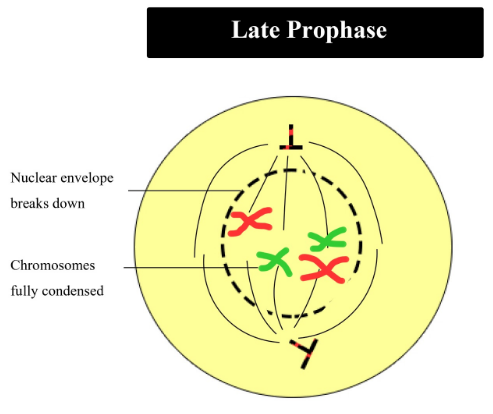
Condensation of chromosomes completed in which phase
(a) Early prophase
(b) Late prophase
(c) Metaphase
(d) Anaphase
Answer
533.7k+ views
Hint: Condensation of chromosomes is completed at the early stage of cell division. During this phase of cell division, the chromosomes move outward from the center of the nucleus to the nuclear envelope.
Complete answer:
Condensation of chromosomes is completed in the late prophase because by the end of prophase the chromosomes arrange themselves for movement which may cause chromosomes to entangle and break if not condensed. The chromosomes during the middle prophase get shortened and thickened and obtain their specific shape and size. During the late prophase, the nuclear membrane and the nucleolus finally vanish completely. The chromosomes then become quite distinct and can be easily differentiated from each other. At opposite ends of the cells centrioles and asters are present while the protein spindles attach to the each chromosomal centromeres from opposite directions. The mitotic spindle during the late prophases starts to arrange the chromosomes and the chromosomes are released by breaking off the nuclear envelope. The mitotic spindle grows more, and some of the microtubules start to chromosomes.
-Prophase marks the onset of the mitotic cycle. It involves both nuclear bad cytoplasmic events.
-Nuclear events or chromosomal events include the spinalization and condensation of chromatin filaments to form short and thick chromosomes.
-Polarization and outward movement of chromosomes towards the periphery of the nucleus and the longitudinal splitting of each chromosome.
So, the correct answer is 'Late prophase'.

Note:
-Metaphase is initiated by the movement of chromosomes towards the center of the cell. The centripetal metaphase chromosome movement is called metakinesis or congression.
-Anaphase begins with the separation of the sister centromere and the segregation of chromatids from each other.
-Telophase is the last phase of mitosis. As far as the cellular events are concerned, telophase represents the prophase reverse or reversed prophase.
Complete answer:
Condensation of chromosomes is completed in the late prophase because by the end of prophase the chromosomes arrange themselves for movement which may cause chromosomes to entangle and break if not condensed. The chromosomes during the middle prophase get shortened and thickened and obtain their specific shape and size. During the late prophase, the nuclear membrane and the nucleolus finally vanish completely. The chromosomes then become quite distinct and can be easily differentiated from each other. At opposite ends of the cells centrioles and asters are present while the protein spindles attach to the each chromosomal centromeres from opposite directions. The mitotic spindle during the late prophases starts to arrange the chromosomes and the chromosomes are released by breaking off the nuclear envelope. The mitotic spindle grows more, and some of the microtubules start to chromosomes.
-Prophase marks the onset of the mitotic cycle. It involves both nuclear bad cytoplasmic events.
-Nuclear events or chromosomal events include the spinalization and condensation of chromatin filaments to form short and thick chromosomes.
-Polarization and outward movement of chromosomes towards the periphery of the nucleus and the longitudinal splitting of each chromosome.
So, the correct answer is 'Late prophase'.

Note:
-Metaphase is initiated by the movement of chromosomes towards the center of the cell. The centripetal metaphase chromosome movement is called metakinesis or congression.
-Anaphase begins with the separation of the sister centromere and the segregation of chromatids from each other.
-Telophase is the last phase of mitosis. As far as the cellular events are concerned, telophase represents the prophase reverse or reversed prophase.
Recently Updated Pages
Master Class 11 Computer Science: Engaging Questions & Answers for Success

Master Class 11 Business Studies: Engaging Questions & Answers for Success

Master Class 11 Economics: Engaging Questions & Answers for Success

Master Class 11 English: Engaging Questions & Answers for Success

Master Class 11 Maths: Engaging Questions & Answers for Success

Master Class 11 Biology: Engaging Questions & Answers for Success

Trending doubts
One Metric ton is equal to kg A 10000 B 1000 C 100 class 11 physics CBSE

There are 720 permutations of the digits 1 2 3 4 5 class 11 maths CBSE

Discuss the various forms of bacteria class 11 biology CBSE

Draw a diagram of a plant cell and label at least eight class 11 biology CBSE

State the laws of reflection of light

10 examples of friction in our daily life




